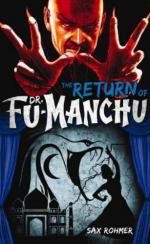“Get along to your room!” directed Smith. “Your apprehensions are unfounded at the moment, but you may as well leave both doors wide open!”
I looked into his face—it was very drawn and grim, and his brow was wet with perspiration, but his eyes had the fighting glint, and I knew that we were upon the eve of strange happenings.
CHAPTER XXIII
A CRY ON THE MOOR
Of the events intervening between this moment and that when death called to us out of the night, I have the haziest recollections. An excellent dinner was served in the bleak and gloomy dining-room by the mulatto, and the crippled author was carried to the head of the table by this same Herculean attendant, as lightly as though he had but the weight of a child.
Van Roon talked continuously, revealing a deep knowledge of all sorts of obscure matters; and in the brief intervals, Nayland Smith talked also, with almost feverish rapidity. Plans for the future were discussed. I can recall no one of them.
I could not stifle my queer sentiments in regard to the mulatto, and every time I found him behind my chair I was hard put to repress a shudder. In this fashion the strange evening passed; and to the accompaniment of distant, muttering thunder, we two guests retired to our chambers in Cragmire Tower. Smith had contrived to give me my instructions in a whisper, and five minutes after entering my own room, I had snuffed the candles, slipped a wedge, which he had given me, under the door, crept out through the window onto the guttered ledge, and joined Smith in his room. He, too, had extinguished his candles, and the place was in darkness. As I climbed in, he grasped my wrist to silence me, and turned me forcibly toward the window.
“Listen!” he said.
I turned and looked out upon a prospect which had been a fit setting for the witch scene in Macbeth. Thunder clouds hung low over the moor, but through them ran a sort of chasm, or rift, allowing a bar of lurid light to stretch across the drear, from east to west—a sort of lane walled by darkness. There came a remote murmuring, as of a troubled sea—a hushed and distant chorus; and sometimes in upon it broke the drums of heaven. In the west lightning flickered, though but faintly, intermittently.
Then came the call.
Out of the blackness of the moor it came, wild and distant—“Help! help!”
“Smith!” I whispered—“what is it? What. . .”
“Mr. Smith!” came the agonized cry . . . “Nayland Smith, help! for God’s sake. . . .”
“Quick, Smith!” I cried, “quick, man! It’s Van Roon—he’s been dragged out . . . they are murdering him . . .”
Nayland Smith held me in a vise-like grip, silent, unmoved!
Louder and more agonized came the cry for aid, and I became more than ever certain that it was poor Van Roon who uttered it.




